
President Ranil Wickremesinghe with Janet Yellen, US Treasury Secretary.
1. Experience and Economic Acumen
President Ranil Wickremesinghe’s extensive experience in political and economic management is a critical asset for Sri Lanka’s economic recovery. His previous roles as Prime Minister and Finance Minister have equipped him with the skills needed to navigate complex economic landscapes and negotiate effectively with international creditors and financial institutions, such as the Paris Club, the Exim Bank of China, and the International Monetary Fund (IMF).
2. Leadership During Crisis
President Ranil Wickremesinghe demonstrated exceptional leadership during a period of severe crisis. As a single member of Parliament, he took on the challenge and became Prime Minister, leading a coalition cabinet from different political parties. This ability to unite diverse political factions was crucial in stabilizing the government and initiating recovery efforts. When the country descended into anarchy and the then President abandoned the nation, Wickremesinghe stepped up to take control. His decisive actions as President brought the chaotic situation under control, restoring order and laying the groundwork for economic recovery.
3. Successful Debt Restructuring Negotiations
One of Wickremesinghe’s notable achievements is the successful negotiation of debt restructuring agreements with the Paris Club, the Exim Bank of China, and the IMF. These agreements are pivotal in easing Sri Lanka’s debt burden and providing the fiscal space necessary for economic recovery.
• Paris Club Agreement: This agreement allows for the rescheduling of debt payments, helping manage immediate liquidity needs and reducing debt servicing costs. It has been instrumental in stabilizing Sri Lanka’s foreign exchange reserves and improving investor confidence.
• Exim Bank of China Agreement: The restructuring of loans from the Exim Bank of China involves extending repayment periods and reducing interest rates, crucial for managing a significant portion of Sri Lanka’s debt owed to China. This agreement underscores Wickremesinghe’s ability to secure favorable terms from key international partners.
• IMF Program: The IMF program has been a cornerstone of Sri Lanka’s economic recovery strategy. It provided essential financial support and technical assistance to stabilize the economy. The program included structural adjustments aimed at fiscal consolidation, enhancing revenue generation, and improving public financial management. President Wickremesinghe’s successful negotiation and implementation of the IMF program demonstrate his ability to work with international financial institutions to achieve economic stability.
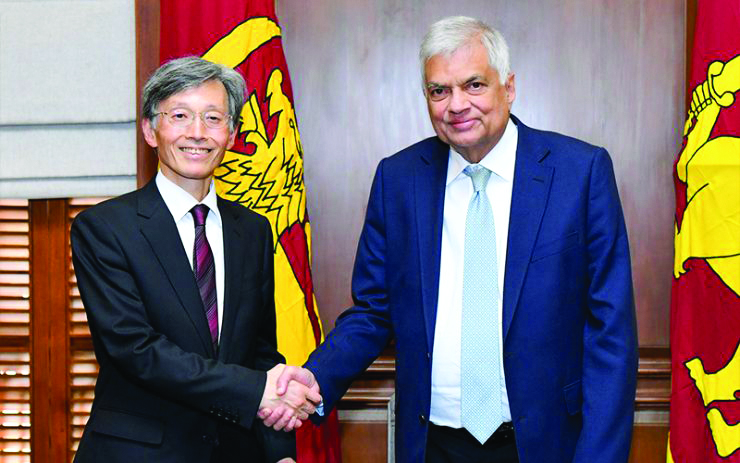
President Ranil Wickremesinghe and Kenji Okamura, Deputy Managing Director, International Monetary Fund (IMF).
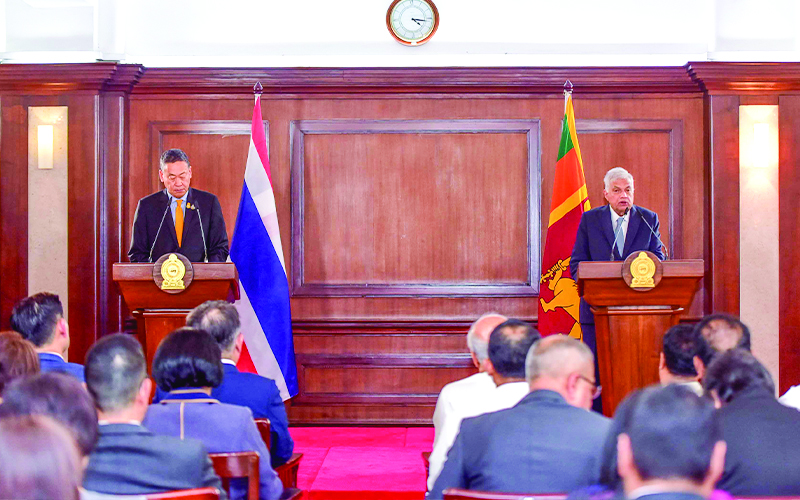
Thailand Prime Minister Srettha Thavisin and President Ranil Wickremesinghe on strengthening bilateral ties and fostering economic cooperation between the two nations.
4. Implementation of Structural Reforms
President Ranil Wickremesinghe’s administration has initiated essential structural reforms aimed at ensuring long-term economic stability. These include comprehensive tax policy changes to broaden the tax base and improve revenue collection, efforts to reduce fiscal deficits, and measures to enhance public sector efficiency. These reforms are necessary to create a sustainable fiscal environment that supports economic growth.
5. Focus on Good Governance and Anti-Corruption
Improving governance and combating corruption are central to President Ranil Wickremesinghe’s economic recovery strategy. President’s administration has implemented stricter anti-corruption laws and increased transparency in government operations, restoring public trust and attracting foreign investment. This focus on good governance is crucial for ensuring that economic gains are not undermined by mismanagement or corruption.
6. Political Stability and Consensus Building
Political stability is essential for economic recovery, and Wickremesinghe has demonstrated an ability to build consensus across political divides. His inclusive approach to governance has involved engaging with opposition parties, civil society, and other stakeholders to ensure broad-based support for economic policies. This political stability is vital for maintaining investor confidence and ensuring the smooth implementation of economic reforms.
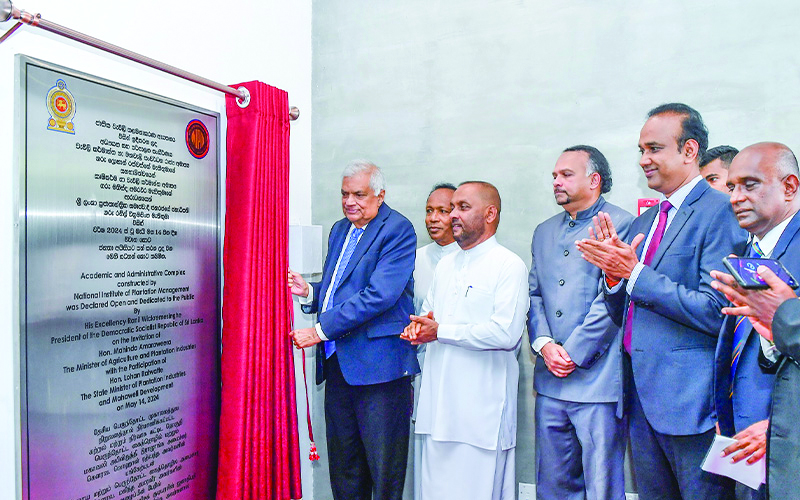
President with Mahinda Amaraweera, Minister of Agriculture and Plantation Industries; Navin Dissanayake, Governor of Sabaragamuwa Province, and Dr. Ramesh Pathirana, Minister of Health during the inauguration of the Athurugiriya National Institute of Plantation Management’s new academic and administrative complex.
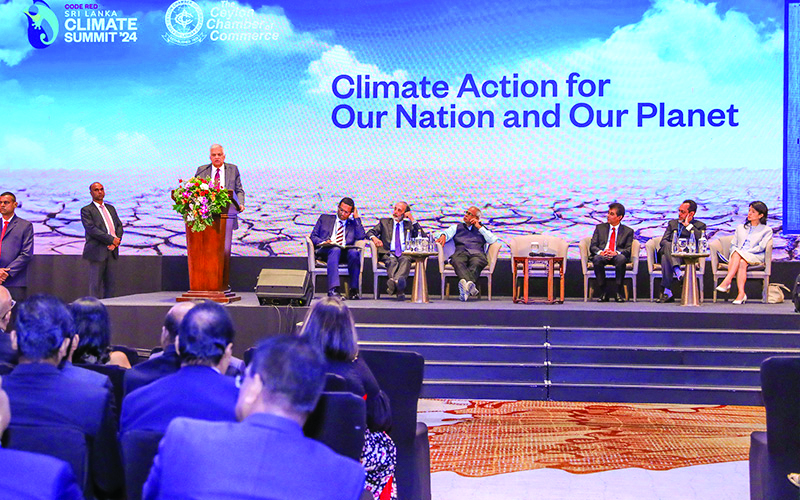
President at the Sri Lanka Climate Summit.
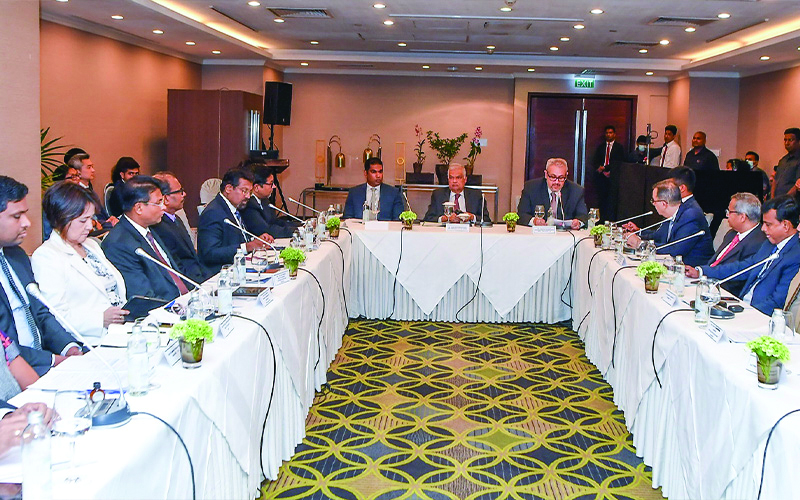
President with other delegates at the ‘Advancing Energy Transition’ roundtable discussion.
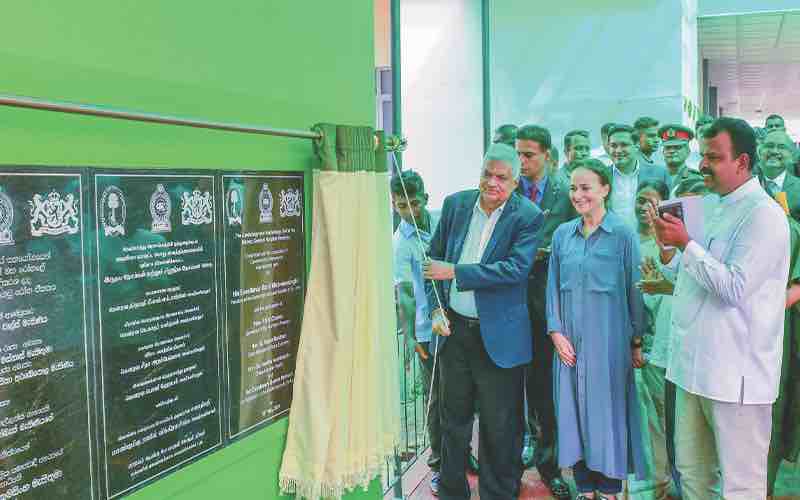
President and Bonnie Horbach, Netherlands Ambassador to Sri Lanka at the inauguration of Advanced Cardiology and Nephrology Units at Vavuniya District General Hospital.
7. Commitment to Social Welfare and Poverty Alleviation
Despite the economic challenges, Wickremesinghe’s administration has continued to prioritize social welfare programs. These programs are designed to mitigate the impact of economic hardship on vulnerable populations, ensuring that recovery efforts do not exacerbate inequality or social unrest. This balanced approach helps maintain social cohesion, which is vital for sustained economic growth.
8. Global Recognition and Support
Under Wickremesinghe’s leadership, Sri Lanka has garnered significant support from international financial institutions and creditor nations. This global support is a testament to the credibility of his economic policies and the trust placed in his administration by international partners. Continued support from entities like the IMF, World Bank, and major bilateral creditors is crucial for the success of Sri Lanka’s economic recovery.
9. Historical Context and Missed Opportunities
Sri Lanka’s economic journey since independence has been fraught with missed opportunities and challenges. After gaining independence in 1948, Sri Lanka was considered one of the most promising economies in Asia, second only to Japan in terms of economic potential. However, political instability, poor economic policies, and prolonged civil conflict hindered its progress. While countries like South Korea and Singapore rapidly advanced economically, Sri Lanka struggled to achieve similar growth and development.
10. Challenges with Previous IMF Programs
Sri Lanka has had multiple agreements with the IMF over the years. However, changes in government often led to the abandonment of these programs before they could be fully implemented. This inconsistency in economic policy has contributed to the country’s ongoing economic challenges. Wickremesinghe’s ability to secure and stick with the current IMF program is a significant departure from this trend, offering a more stable and consistent approach to economic recovery.
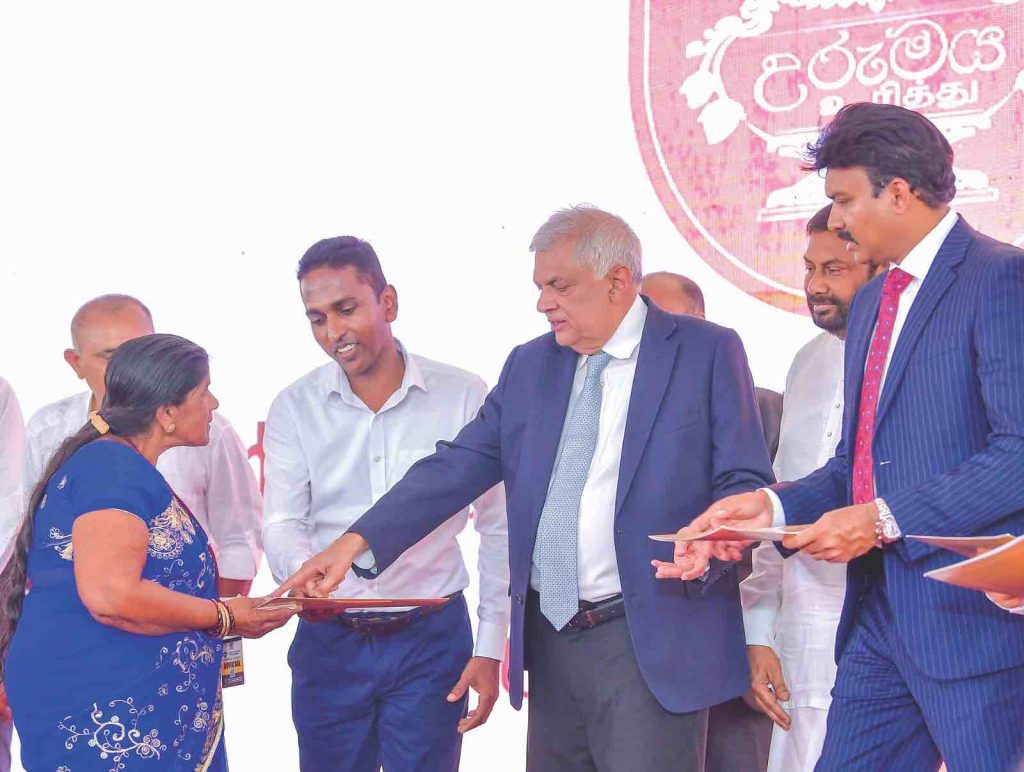
President with W. D. Weerasingha, MP and Ampara District Coordination Committee Chairman, Senthil Thondaman, Eastern Province Governor and other MPs where symbolic land deeds were handed over to eligible recipients at the Weerasinghe Stadium, Ampara.
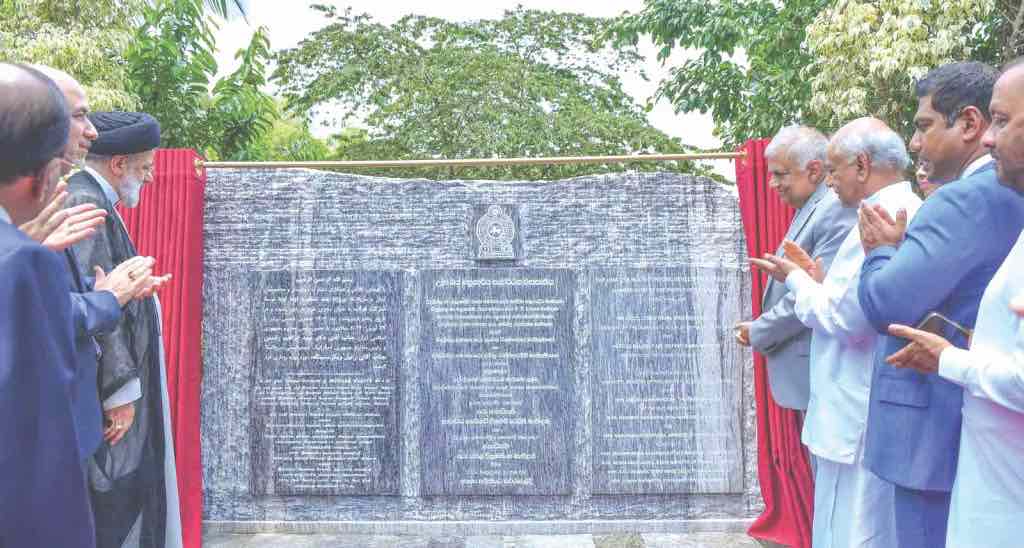
Unveiling of the commemorative plaque by President Ranil Wickremesinghe and late Iranian President Ebrahim Raisi. Also present were Prime Minister Dinesh Gunawardena, Kanchana Wijesekera, Minister of Power and Energy of Sri Lanka, A.J.M. Muzammil, Uva Provincial Governor and Mahinda Amaraweera, Minister of Agriculture and Plantation Industries of Sri Lanka.
How Wickremesinghe Secured Parliamentary Support for Reforms
One of the most critical aspects of Wickremesinghe’s leadership has been his ability to secure a parliamentary majority to support necessary reforms and laws. Despite initially being a single member of Parliament, Wickremesinghe’s strategic political maneuvering and coalition-building skills have been instrumental.
1. Forming a Coalition Government: Wickremesinghe managed to bring together a coalition of different political parties. This coalition-building was essential in securing a parliamentary majority, enabling the passage of critical economic reforms and legislation. His ability to unite diverse political factions under a common goal of national recovery was a significant achievement.
2. Negotiation and Diplomacy: Through continuous negotiation and diplomatic efforts, Wickremesinghe was able to persuade key political leaders and factions to support his economic recovery agenda. His experience and reputation as a seasoned politician played a crucial role in these negotiations.
3. Transparent Communication: President Ranil Wickremesinghe maintained transparent communication with both the public and political leaders, explaining the necessity of reforms and the long-term benefits for the country. This transparency helped build trust and reduce resistance to his policies.
4. Strategic Appointments and Alliances: By making strategic appointments within his administration and forming alliances with influential political figures, Wickremesinghe strengthened his political base. These alliances were critical in ensuring the smooth passage of economic reforms through Parliament.
Conclusion
President Ranil Wickremesinghe’s leadership has been pivotal in stabilizing Sri Lanka’s economy and setting it on a path to recovery. His experience, successful debt restructuring negotiations, commitment to structural reforms, focus on good governance, political stability, and prioritization of social welfare are critical factors that justify his continuation as President. These elements ensure that the momentum of economic recovery is maintained and that Sri Lanka is positioned for sustainable growth and prosperity.
The agreements with the Paris Club, the Exim Bank of China, and the successful implementation of the IMF program further underscore his ability to secure vital international support, which is indispensable for the country’s economic future. His ability to secure a parliamentary majority through coalition-building, negotiation, and transparent communication further highlights his capability to lead Sri Lanka through this critical period.
Given Sri Lanka’s historical context of missed opportunities and economic challenges, consistent and stable leadership under President Ranil Wickremesinghe is essential to navigate the nation through its recovery and toward a more prosperous future.
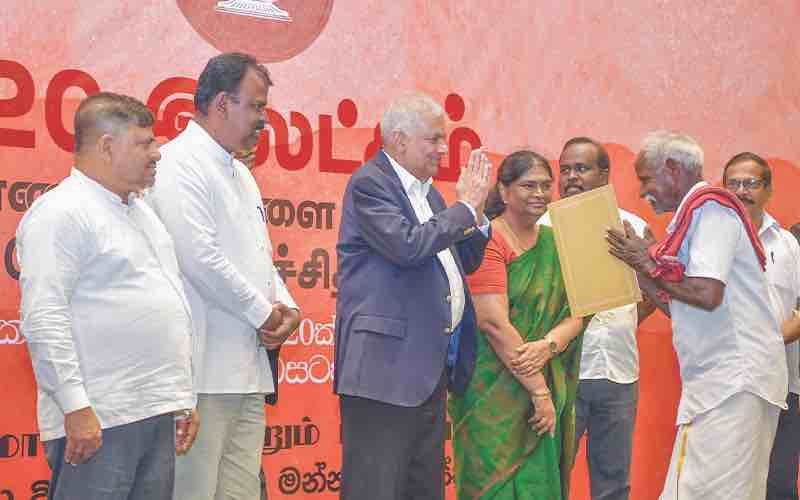
President with K. Kader Masthan, State Minister of Rural Economy of Sri Lanka; Kulasingam Thileepan, Vanni District Parliamentarian; P.S.M Charles, Governor of the Northern Province, and Selvam Adaikalanathan, MP during the issuing of free land deeds in Vavuniya under the Urumaya initiative.
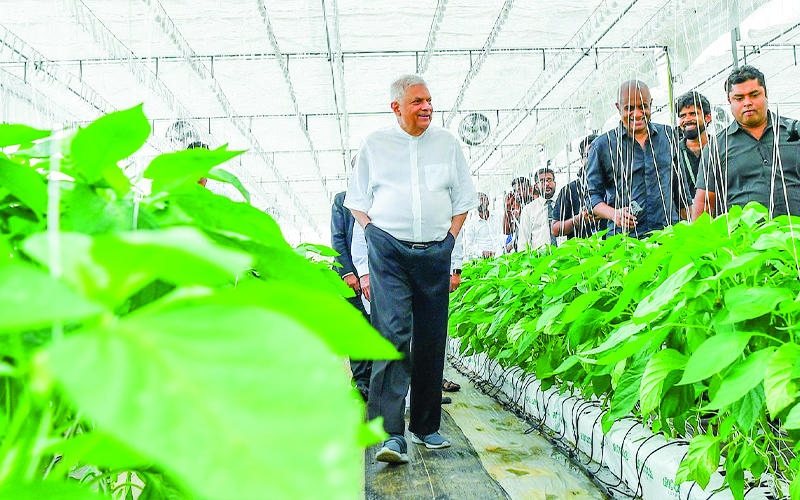
President during an observation tour of the AiGrow Company’s greenhouse in Nelumdeniya, Kegalle.
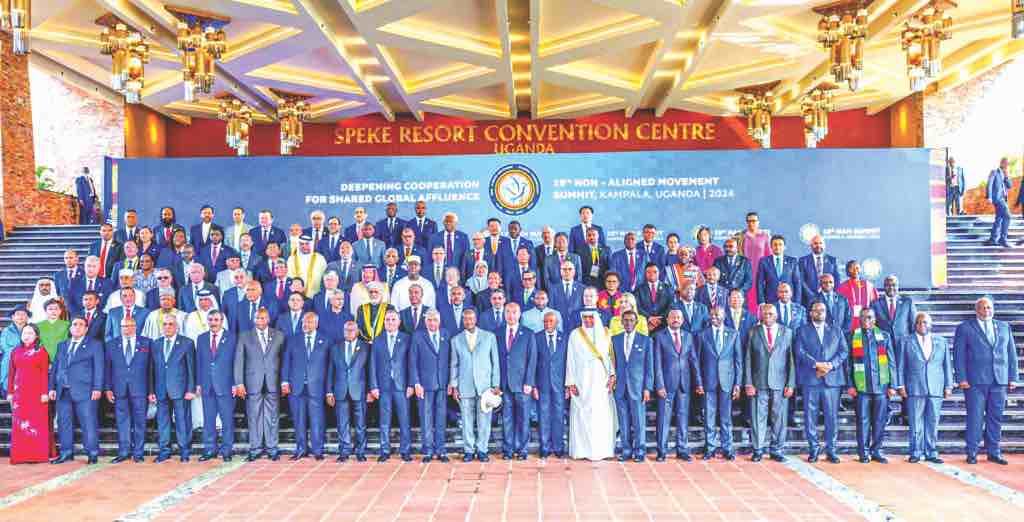
President Ranil Wickremesinghe at the 19th Non-Aligned Movement (NAM) Summit in Kampala, Uganda.





